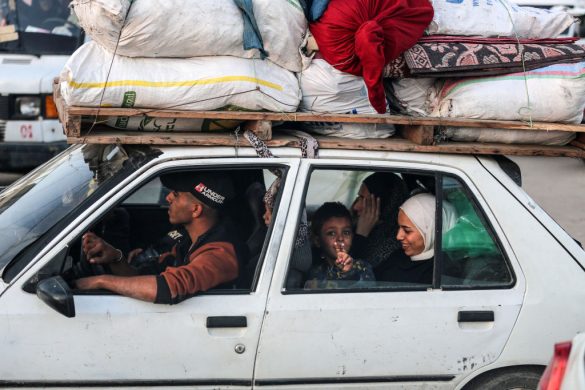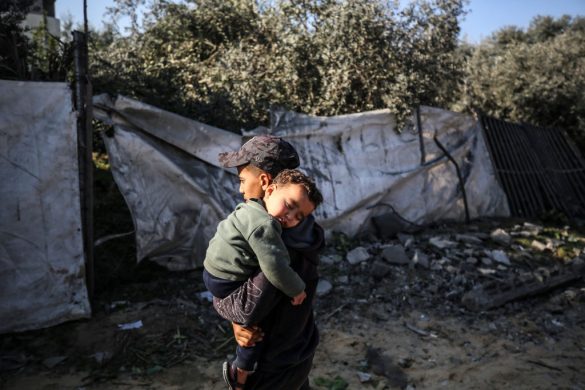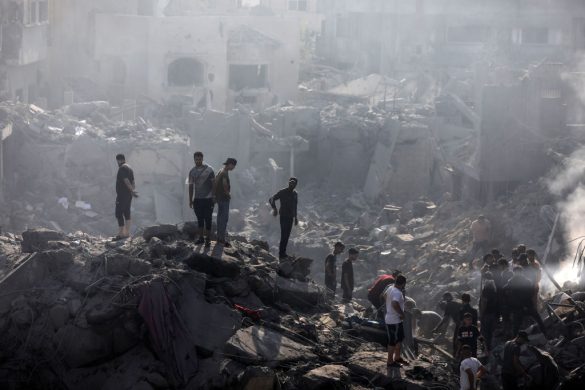Mens Syriens nabolande er ved at synke i knæ over byrden fra den enorme flygtningestrøm, er porten til EU så godt som lukket og kun to EU-lande – Tyskland og Sverige – har modtaget et nævneværdigt antal flygtninge fra den humanitære katastrofe.
JOHANNESBURG, 25 September 2013 (IRIN): The human exodus from Syria started with a trickle in the latter half of 2011 that became a steady stream in 2012, and turned into a flood in 2013.
The UN Refugee Agency (UNHCR) estimates that on average 5.000 Syrians flee their country every day and that by mid-September around 2,1 million were living as refugees, mainly in neighbouring countries.
Lebanon alone has taken in 752.000, while Jordan, Turkey, Iraq and Egypt have also accepted hundreds of thousands.
The Turkish government says it has spent 2 billion US dollar (11 milliarder DKR) responding to the refugee influx from Syria while Jordan has spent a similar amount just during the first nine months of 2013.
A recent World Bank report estimated that the conflict and the waves of refugees it has created has doubled unemployment in Lebanon, cut GDP growth and strained health, education, water and sanitation systems to breaking point.
Not so in Europe
Although the European Union (EU) has committed 1,75 billion dollar to relief efforts in and around Syria, making it the largest international donor, it has shown little solidarity with countries like Turkey, Jordan and Lebanon, in terms of helping to shoulder an increasingly unmanageable refugee burden.
Despite its relative proximity to the conflict, Europe is hosting just 41.000 Syrian asylum seekers, the majority of them in two countries – Germany and Sweden.
Not only does the EU lack a joint policy to govern the treatment and protection of Syrian asylum seekers by its member states, Europe’s fortress-like borders are making it extremely difficult for Syrians to reach EU territory.
A report released earlier this month by the European Council on Refugees and Exiles (ECRE) notes: “Access to Europe is increasingly difficult, and legal channels of entering the EU are almost non-existent, especially as Member States closed their embassies in Syria.”
Gaining entry to the EU
For many refugees the only option is to pay smugglers to help them enter EU territory irregularly, but even this has become more difficult.
The 206 km Greek-Turkish border used to be the main entry point to the EU for migrants and asylum seekers.
Not any longer.
In August 2012, the Greek government, with assistance from the European border agency, Frontex, significantly tightened frontier security measures, including erecting a 12 km stretch of fence along one of the most popular crossing points.
Most Syrian asylum seekers attempting to reach Europe now use much riskier sea routes between Turkey and the Greek islands and between Egypt and the south coast of Italy.
While a number of deaths from drowning and dehydration have been reported, UNHCR estimates that 4.600 Syrians arrived in Italy by sea between January and early September 2013, two-thirds of them in August.
Increasing numbers are also entering Europe via Bulgaria, where reception centres have reached capacity.
An unknown number of asylum seekers are now being kept in two detention centres while their asylum applications are decided, which can take as long as a year.
No Common European Asylum System
“The EU has in the past urged Turkey to keep its borders open to Syrians wishing to seek asylum, while at the same time focusing resources on controlling irregular entry at its own external frontiers,” said António Guterres, UN High Commissioner for Refugees, at a meeting of the EU Justice and Home Affairs Council in July.
“While the management of borders is a sovereign right and legitimate priority of states, the means must be found to ensure that Syrians seeking protection at EU frontiers can gain access to territory, procedures and safety,” Guterres noted.
He also expressed concern about the lack of consistency among Member States in their adjudication (bedømmelse) of asylum claims from Syrians, and the types of protection being granted.
The EU still has a long way to go in implementing a Common European Asylum System, with some states much less likely to grant refugee status than others.
Greece, for example, has a notoriously dysfunctional asylum system, and granted refugee status to only two out of 275 Syrians who applied in 2012, according to UNHCR.
In the same year, nearly 8.000 Syrians were arrested and detained for irregularly entering or staying in Greece.
Although the Greek Ministry of Public Order and Citizen Protection has since ordered that Syrians only be detained for as long as it takes to verify their identity and then released, most of those with the means to do so move on to countries where they will have a better chance of receiving protection.
Protection can vary
Læs videre på
http://www.irinnews.org/report/98826/no-welcome-mat-for-syrians-in-europe
Se også telegrammet
http://www.u-landsnyt.dk/nyhed/26-09-13/ung-syrer-vi-er-tvunget-til-bruge-de-illegale-veje














